17 start with S start with S

Saving All the Parts is a journalist's exploration of the intertwining of endangered species protection and the economic future of resource dependent communities -- those with local economies based on fishing, logging, ranching, mining, and other resource intensive industries. Rocky Barker presents an insightful overview of current endangered species controversies and a comprehensive look at the wide-ranging implications of human activities.
The book analyzes trends in natural resource management, land use planning, and economic development that can lead to a future where economic activity can be sustained without the loss of essential natural values. Throughout, Barker provides a thorough and balanced analysis of both the ecological and economic forces that affect the lives and livelihoods of the nation's inhabitants -- both human and animal.

Security and development matter: they often involve issues of life and death and they determine the allocation of truly staggering amounts of the world’s resources. Particularly since the start of the wars in Afghanistan and Iraq, there has been momentum in policy circles to merge the issues of security and development to attempt to end conflicts, create durable peace, strengthen failing states, and promote the conditions necessary for people to lead healthier and more prosperous lives.
In many ways this blending of security and development agendas seems admirable and designed to produce positive outcomes all around. However, it is often the case that the two concepts in combination do not receive equal weight, with security issues getting priority over development concerns. This is not desirable and actually undermines security in the longer term. Moreover, there are major challenges in practice when security practitioners and development practitioners are asked to agree on priorities and work together.
Security and Development in Global Politics illuminates the common points of interest but also the significant differences between security and development agendas and approaches to problem solving. With insightful chapter pairings—each written by a development expert and a security analyst—the book explores seven core international issues: aid, humanitarian assistance, governance, health, poverty, trade and resources, and demography. Using this comparative structure, the book effectively assesses the extent to which there really is a nexus between security and development and, most importantly, whether the link should be encouraged or resisted.

In Seeing Like a Citizen, Kara Moskowitz approaches Kenya’s late colonial and early postcolonial eras as a single period of political, economic, and social transition. In focusing on rural Kenyans—the vast majority of the populace and the main targets of development interventions—as they actively sought access to aid, she offers new insights into the texture of political life in decolonizing Kenya and the early postcolonial world.
Using multisited archival sources and oral histories focused on the western Rift Valley, Seeing Like a Citizen makes three fundamental contributions to our understanding of African and Kenyan history. First, it challenges the widely accepted idea of the gatekeeper state, revealing that state control remained limited and that the postcolonial state was an internally varied and often dissonant institution. Second, it transforms our understanding of postcolonial citizenship, showing that its balance of rights and duties was neither claimed nor imposed, but negotiated and differentiated. Third, it reorients Kenyan historiography away from central Kenya and elite postcolonial politics. The result is a powerful investigation of experiences of independence, of the meaning and form of development, and of how global political practices were composed and recomposed on the ground in local settings.
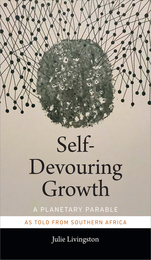
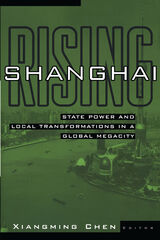

How China’s borderlands transformed politically and culturally throughout the twentieth and twenty-first centuries.
China’s land borders, shared with fourteen other nations, are the world’s longest. Like all borders, they are not just lines on a map but also spaces whose histories and futures are defined by their frontier status. An ambitious appraisal of China’s borderlands, Shifting Sands addresses the full scope and importance of these regions, illustrating their transformation from imperial backwaters to hotbeds of resource exploitation and human development in the age of neoliberal globalization.
Xiaoxuan Lu brings to bear an original combination of archival research, fieldwork, cartography, and landscape analysis, broadening our understanding of the political economy and cultural changes in China’s borderlands in the twentieth and twenty-first centuries. While conventional wisdom looks to the era of Deng Xiaoping for China’s “opening,” Lu shows the integration of China’s borderlands into national and international networks from Sun Yat-sen onward. Yet, while the state has left a firm imprint on the borderlands, they were hardly created by China alone. As the Chinese case demonstrates, all borderlands are transnational, their physical and socioeconomic landscapes shaped by multidirectional flows of materials, ideas, and people.

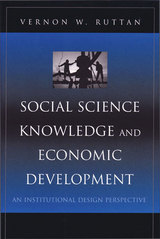
With its emphasis on interdisciplinarity, Social Science Knowledge and Economics Developmentis important reading for social scientists, development economists, and in the development studies classroom.
Vernon W. Ruttan is Regents Professor Emeritus in the Department of Applied Economics at the University of Minnesota.


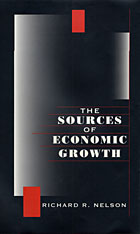
Technological advance is the key driving force behind economic growth, argues Richard Nelson. Investments in physical and human capital contribute to growth largely as handmaidens to technological advance. Technological advance needs to be understood as an evolutionary process, depending much more on ex post selection and learning than on ex ante calculation. That is why it proceeds much more rapidly under conditions of competition than under monopoly or oligopoly.
Nelson also argues that an adequate theory of economic growth must incorporate institutional change explicitly. Drawing on a deep knowledge of economic and technological history as well as the tools of economic analysis, Nelson exposes the intimate connections among government policies, science-based universities, and the growth of technology. He compares national innovation systems, and explores both the rise of the United States as the world’s premier technological power during the first two-thirds of the twentieth century and the diminishing of that lead as other countries have largely caught up.
Lucid, wide-ranging, and accessible, the book examines the secrets of economic growth and why the U.S. economy has been anemic since the early 1970s.
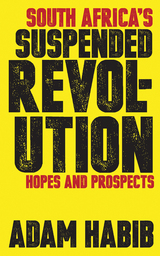
South Africa’s Suspended Revolution tells the story of South Africa’s democratic transition and the prospects for the country to develop a truly inclusive political system. Beginning with an account of the transition in the leadership of the African National Congress from Thabo Mbeki to Jacob Zuma, the book then broadens its lens to examine the relationship of South Africa’s political elite to its citizens. It also examines the evolution of economic and social policies through the democratic transition, as well as the development of a postapartheid business community and a foreign policy designed to re-engage South Africa with the world community.
Written by one of South Africa’s leading scholars and political commentators, the book combines historical and contemporary analysis with strategies for an alternative political agenda. Adam Habib connects the lessons of the South African experience with theories of democratic transition, social change, and conflict resolution. Political leaders, scholars, students, and activists will all find material here to deepen their understanding of the challenges and opportunities of contemporary South Africa.
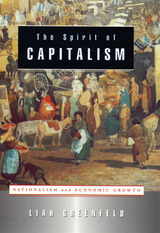
The Spirit of Capitalism answers a fundamental question of economics, a question neither economists nor economic historians have been able to answer: what are the reasons (rather than just the conditions) for sustained economic growth? Taking her title from Max Weber's famous study on the same subject, Liah Greenfeld focuses on the problem of motivation behind the epochal change in behavior, which from the sixteenth century on has reoriented one economy after another from subsistence to profit, transforming the nature of economic activity. A detailed analysis of the development of economic consciousness in England, the Netherlands, France, Germany, Japan, and the United States allows her to argue that the motivation, or "spirit," behind the modern, growth-oriented economy was not the liberation of the "rational economic actor," but rather nationalism. Nationalism committed masses of people to an endless race for national prestige and thus brought into being the phenomenon of economic competitiveness.
Nowhere has economic activity been further removed from the rational calculation of costs than in the United States, where the economy has come to be perceived as the end-all of political life and the determinant of all social progress. American "economic civilization" spurs the nation on to ever-greater economic achievement. But it turns Americans into workaholics, unsure of the purpose of their pursuits, and leads American statesmen to exaggerate the weight of economic concerns in foreign policy, often to the detriment of American political influence and the confusion of the rest of the world.
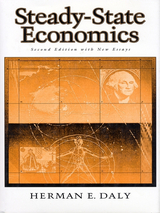
First published in 1977, this volume caused a sensation because of Daly's radical view that "enough is best." Today, his ideas are recognized as the key to sustainable development, and Steady-State Economics is universally acknowledged as the leading book on the economics of sustainability.
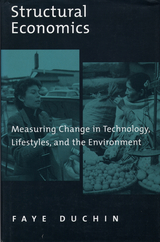
In all societies, the main causes of environmental degradation are resource extraction and the generation of wastes by households and industries. Realistic strategies for mitigating these impacts require an understanding of both the technologies by which resources are transformed into products, and the lifestyle choices that shape household use of such products.
Structural Economics provides a framework for developing and evaluating such strategies. It represents an important new approach to describing household lifestyles and technological choices, the relationships between them, and their impact on resource use and waste. In this volume, economist Faye Duchin provides for the first time an authoritative and comprehensive introduction to the field, including its social as well as its technological dimensions. The presentation is accessible to non-specialists while also including a substantial amount of new research.
Duchin's primary achievement is to integrate a qualitatively rich understanding of technologies and lifestyles into a flexible, quantitative framework grounded in established principles of input-output economics and social accounting. She uses tools and insights from areas as diverse as demography and market research to conceptualize and describe different categories of households and their lifestyles. She also draws on the expertise of engineers and physical scientists to examine the potential for technological change. The framework Duchin develops permits the rigorous and detailed analysis of specific scenarios for alternative technologies and changes in lifestyle. The author uses the case of Indonesia for illustration and to refine new concepts by testing their relevance against factual information.
The new field of structural economics represents an important step forward in the effort to apply the power of science to solving the problems of modern societies. This book should prove invaluable to students and scholars of economics, sociology, or anthropology, as well as environmental scientists, policymakers at all levels, and anyone concerned with a practical interpretation of the elusive concept of sustainable development.

In 1965, a group of economists at Harvard University established the Project for Quantitative Research in Economic Development in the Center for International Affairs. Brought together by a common background of fieldwork in developing countries and a desire to apply modern techniques of quantitative analysis to the policy problems of these countries, they produced this volume, which represents that part of their research devoted to formulating operational ways of thinking about development problems.
The seventeen essays are organized into four sections: General Planning Models, International Trade and External Resources, Sectoral Planning, and Empirical Bases for Development Programs. They raise some central questions: To what extent can capital and labor substitute for each other? Does development require fixed inputs of engineers and other specialists in each sector or are skills highly substitutable? Is the trade gap a structural phenomenon or merely evidence of an overvalued exchange rate? To what extent do consumers respond to changes in relative prices?
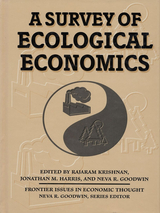
The emergent discipline of ecological economics is based on the idea that the world's economies are a function of the earth's ecosystems -- an idea that radically reverses the world view of neoclassical economics. A Survey of Ecological Economics provides the first overview of this new field, and a comprehensive and systematic survey of its critical literature.
The editors of the volume summarize ninety-five seminal articles, selected through an exhaustive survey, that advance the field of ecological economics and represent the best thinking to date in the area. Each two- to three-page summary is far more comprehensive than a typical abstract, and presents both the topics covered in each paper and the most important arguments made about each topic. Sections cover:
- historical perspective
- definition, scope, and interdisciplinary issues
- theoretical frameworks and techniques
- energy and resource flow analysis
- accounting and evaluation
- North-South/international issues
- ethical/social/institutional issues
A Survey of Ecological Economics is the first volume in the Frontier Issues in Economic Thought series produced by the Global Development And Environment Institute at Tufts University.
READERS
Browse our collection.
PUBLISHERS
See BiblioVault's publisher services.
STUDENT SERVICES
Files for college accessibility offices.
UChicago Accessibility Resources
home | accessibility | search | about | contact us
BiblioVault ® 2001 - 2024
The University of Chicago Press









